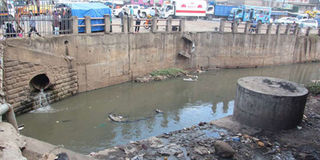And here, a rogue view: Some people ‘love’ a filthy Nairobi

A pipe empties sewage into Nairobi River in downtown Nairobi. PHOTO | FILE | NATION MEDIA GROUP
What you need to know:
If you live in a part of a city where the streets are terribly potholed and garbage piles up, you will probably pay Sh25,000 for an apartment, that would cost Sh45,000 if the roads were smooth, garbage collected and streets lit.
If you are a small shop owner, you would probably pay Sh100,000 to lease premises that would cost double if the place was Kigali-like.
The state of Nairobi, especially the roads off the main ones, is atrocious. In the Kasarani suburb recently, the residents essentially went to war over the poor state of area roads.
GENERAL SQUALOR
When it rains and it floods, Nairobi residents post on social media photos of gutted roads, garbage piles, polluted rivers and streams and general squalor that can frighten those not hardened about the state of Kenya’s capital. On top of all his legal troubles and pains, Nairobi Governor Mike Sonko has had to endure a flogging in the press and social media about his alleged role in bringing Nairobi to this sorry state. However, he only bears a small part of the blame.
Nairobi has the same problem most cities in Africa — from Johannesburg, Lagos to Cairo — have. There has been a growing view that democracy is bad for African cities as elected mayors and governors have been hopeless. According to this school of thought, most voters don’t live in the posh areas, don’t have cars and don’t live in their own homes, and they think that the wealthy minority are just getting their knickers in a twist. That the best way to get our cities working again is to move away from directly elected leaders.
CITY CARTELS
One of the cleanest cities in Africa, and according to some measures cleanest, is the Rwandan capital Kigali. Though the reasons why it wins all those awards might be unique, some proponents of the model point to the fact that its mayor is not directly elected like that of Kampala or the governor of Nairobi. Kigali’s mayor is elected by an electoral college made up of members of its various councils, and bureau, some appointed by the President.
When Kampala was sinking in filth and dysfunction under an elected mayor, it seems President Yoweri Museveni thought the approach in Rwanda could help. He set up the Kampala City Council Authority, to which he directly appointed officials, and threw money at it. He was fortunate to get a tough unflinching woman, Jennifer Musisi to head it. She shook up Kampala and turned the place around dramatically. She made gazillions of enemies and upset the usual city cartels. But she didn’t care because she was not going to beg anyone for votes.
REVERTED TO FILTH
In the 2016 election, the ruling National Resistance Movement (NRM), already a minority party in Kampala, was obliterated in ways that stunned Museveni. Musisi was thrown under the bus. Since her departure, Kampala has reverted to the filth, and with elections approaching early next year, the NRM might do better electorally from the rot.
But there are towns and cities where elected leaders have done a sterling job. In Kenya, for example, Kisumu City has cleaned up rather well under elected leaders, most notably Governor Peter Anyang’ Nyong’o. So, has Mwanza in Tanzania. When Babatunde Fashola was governor of Lagos State from 2007 to 2015, he did the impossible: He changed a presumably ungovernable and addicted-to-filth-and-disorder Lagos to the pride of many.
On the other hand, in the last years of Kanu rule, when mayors were not directly elected, Nairobi was worse off than it is today.
From this, one can’t generalise whether democracy is bad for African cities, and appointed leadership better.
DEPRESSED RENTS
However, as the Kampala case shows, and the fact that Sonko could be re-elected because, warts and all, he actually remains popular in parts of the city, suggests that there are significant constituencies that have an objective interest in filthy cities with gutted roads. And it’s not the garbage cartels. It’s ordinary decent city folk.
It’s easy to see why. If you live in a part of a city where the streets are terribly potholed and garbage piles up, you will probably pay Sh25,000 for an apartment, that would cost Sh45,000 if the roads were smooth, garbage collected and streets lit. If you are a small shop owner, you would probably pay Sh100,000 to lease premises that would cost double if the place was Kigali-like.
Tax collectors will fear to come to tough neighbourhoods, and even electricity workers know better than go around jumping over potholes and garbage piles dismantling illegal connections.
Working people and the urban underclass benefit when bad infrastructure and lack of services leads to depressed rents and other costs, which they can afford. In other cities in Africa, we’ve seen resistance to new roads to residential areas because the people know the rent will increase. That is a problem for landlords but not for the people as they use bodaboda that cut through panya routes (shortcuts) to the properties.
BUILD ECONOMIES
The way to fix the problem of a city like Nairobi or Kampala is not so much through electoral politics or withholding it. It’s to build city economies that put more money in the majority of residents’ pockets. They will demand, and get, a clean city.
Mr Onyango-Obbo is curator of the Wall of Great Africans and publisher of explainer site Roguechiefs.com. @cobbo3




